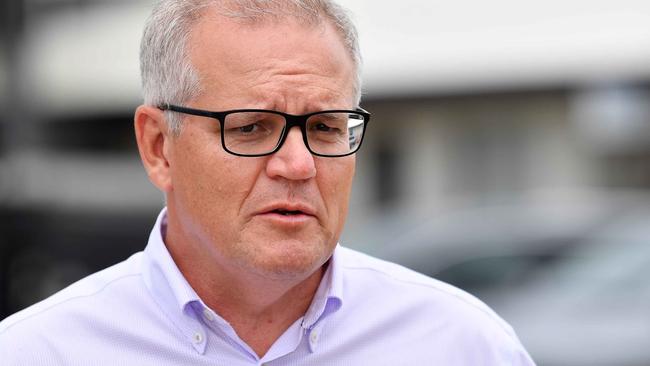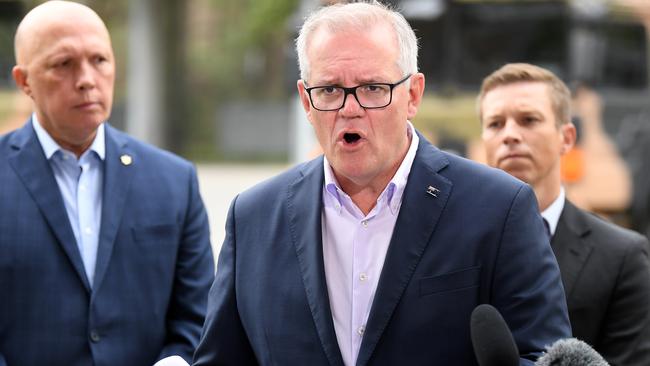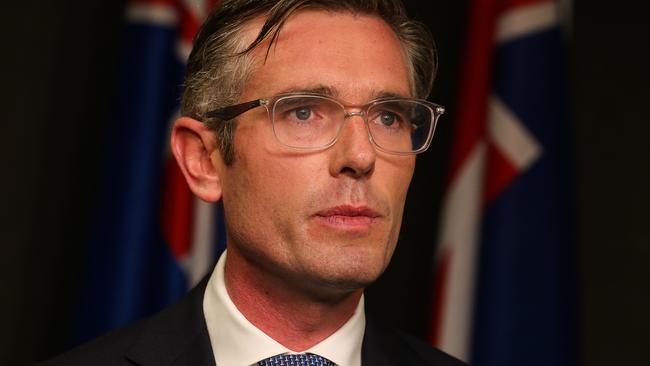Again, in a crisis, Scott Morrison seeks to avoid responsibility
Scott Morrison found himself managing yet another disaster this week – and resorting to a classic piece of political spin.
National
Don't miss out on the headlines from National. Followed categories will be added to My News.
Bushfires, Covid and now floods – Scott Morrison’s time as Prime Minister has been defined by crises. And so here we are again, wondering how much blame Mr Morrison should bear for the mismanagement of a disaster.
Residents in flood-affected areas of northern New South Wales are justifiably angry at the lack of support they received when the waters rose.
Many had to wait on their roofs for days before being rescued, or rely on their fellow private citizens for help. Essential supplies were sparse.
None of that is any one person’s fault, and there is blame to share between the state and federal governments. Mr Morrison has not been idle: he (eventually) declared the floods a national emergency, and announced financial support for those affected.
So I’m not for a moment suggesting the Prime Minister is solely responsible. But I do want to highlight his characteristic attempts to avoid taking any real responsibility.

Speaking in Goonellebah on Wednesday, Mr Morrison fell back on one of his classic moves: suggesting criticism of his government was actually criticism of someone else. In this case, the Australian Defence Force.
“I know there’s been some criticism, both levelled at the federal government, state government. But don’t blame the ADF, OK? We won’t cop that. The ADF are doing an amazing job,” Mr Morrison said.
Earlier in the week, we also heard Defence Minister Peter Dutton say he wouldn’t “cop criticism of the ADF”.
Let’s get the most basic point out of the way here: no one was criticising the ADF. They were criticising the state and federal governments.
We have written about this particularly irritating form of political spin before.
We saw it when the Prime Minister claimed people mocking his photo op at a hair salon were actually “sneering at millions of Australians”.
We saw it during Mr Morrison’s spat with French President Emmanuel Macron, when Mr Macron accused the Prime Minister of lying to him. Mr Morrison reacted to that claim by saying he wouldn’t “cop sledging at Australia”, as though his counterpart had criticised the entire country rather than, very specifically, its leader.
Back to Mr Morrison’s Wednesday press conference.
A reporter asked who people should blame for the fact that most rescues carried out on that Monday were by private citizens, some of them “even on kayaks”.
“If they had not been there, hundreds of people would have died. So who do those people blame?” they asked.
“This is about thanking those who, in the midst of that disaster, were able to be first on the scene,” said Mr Morrison.
“I think we have to be realistic that in any natural disaster we don’t have those resources, have the ADF just waiting around the corner. I mean, we were assembling those resources. We were pre-positioning those people. There were ADF saving people with helicopters, winching them off roofs on Monday, and that was occurring.
“But in any natural disaster, everyone has a role to play. And the suggestion that it is only the governments that are involved in an emergency response – I don’t think the community agrees with that, by the way. And they certainly showed that by what they did bravely.”

When asked specifically about flood victims’ anger at the government, he empathised, but suggested such anger was a routine, unavoidable feature of natural disasters.
“It is very common in natural disasters that the frustration and the anger and the sense of abandonment – this happens in almost every natural disaster, because of the scale,” he said.
“Do you take responsibility for why they feel abandoned?” a reporter asked.
“I feel deeply and empathise absolutely with how people feel when they find themselves in these situations,” he replied.
“This is a very complex and very challenging environment in which to operate. But I am in awe of the collective response that has been put in place.
“So I absolutely understand the frustration, I understand the anger, I understand the disappointment, I understand the sense of abandonment.
“So what do we do about that? We restore. We support. We fund.”
That’s a no, then.
Compare the Prime Minister’s deflection of responsibility to what we heard from New South Wales Premier Dominic Perrottet.
“There is no doubt that there should have been better co-ordination on the ground,” Mr Perrottet said, calling elements of the emergency response “unacceptable”.
“I don’t want to see any of those things happen again. We’ve got to learn from this.”
In that vein, he promised a review of the flood response to examine what went wrong.

We do not expect our politicians to be perfect, or our governments to be faultless. Mistakes are inevitable. But we do expect leaders to take responsibility when those mistakes happen; to be honest and upfront about what went wrong.
Mr Morrison instead has a long history of blame-shifting, and of ducking responsibility. He did it during the bushfires, during the vaccine rollout, and this week he was at it again.
Let me repeat one of his more galling quotes from earlier.
“In any natural disaster, everyone has a role to play. And the suggestion that it is only the governments that are involved in an emergency response – I don’t think the community agrees with that, by the way. And they certainly showed that by what they did bravely.”
The people who rescued members of their communities on kayaks weren’t doing it because they didn’t think it was the government’s job. They were doing it out of necessity, because the government was absent.
Managing crises and keeping people safe is, in fact, the most important job of government. If the Prime Minister can’t even properly acknowledge this time’s failures, how can we have any confidence that the next disaster will be managed better?
Originally published as Again, in a crisis, Scott Morrison seeks to avoid responsibility


